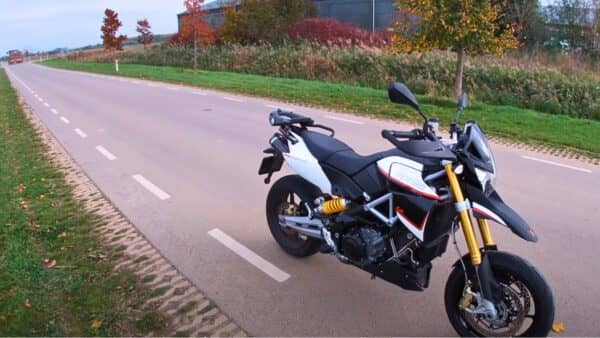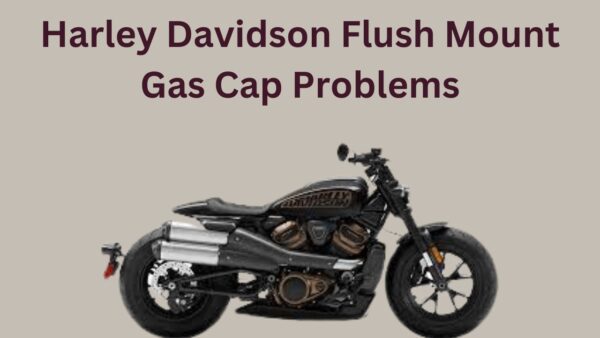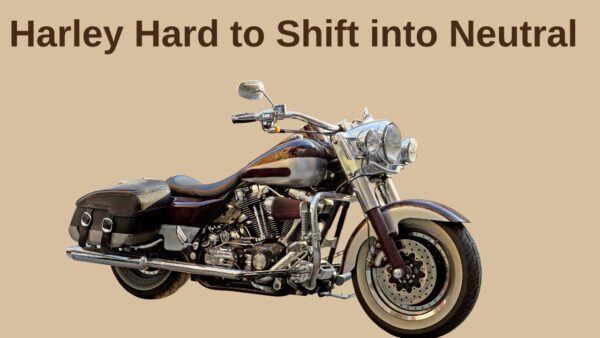The Aprilia Dorsoduro 1200 is a renowned motorcycle that has carved a niche in the adventure sports category.

However, like any machine, it’s not without its share of issues. So, in this article, we will cover the most common problems and provide you with solutions.
Let’s begin!
Aprilia Dorsoduro 1200 Problems
Aprilia Dorsoduro 1200 problems are starting issues, electric starter motor stalling, cold start problems, general warning light issues, rev limiter, and shift light adjustments problems.
1. Starting Issues
The Aprilia Dorsoduro 1200 is known to have occasional starting problems, particularly when the engine is cold.
This may manifest in issues with the electric starter motor, or the bike not maintaining the minimum RPM.
One potential solution to these problems is to verify the condition of your battery. A weak or dying battery can make it challenging to start your bike, especially in colder conditions.
You can check the battery’s voltages using a multimeter, it should be 12.6 Volts when the bike is off.
If the voltage drops significantly when trying to start the bike, you may need a new battery.
Related: Aprilia Caponord 1200 Problems
Another common cause is faulty spark plugs. If they are worn out or dirty, it can result in poor ignition.
You can try removing and inspecting the spark plugs. If they are black or oily, it is advisable to replace them.
If they are dry, but look worn or have a large gap, consider replacing them as well.
Lastly, issues with the bike’s idle speed or fuel/air mixture can cause the bike to stall or have trouble maintaining minimum RPMs.
You might need to adjust your bike’s idle speed or the fuel/air mixture. For this, check the manufacturer’s manual for the recommended settings and adjustment procedures.
2. Electric Starter Motor Stalling
This issue can lead to your bike taking longer to start, or in severe cases, not starting at all.
Often, this problem can be related to the bike’s battery losing its charge, especially when the motorcycle has been idle for a few days.
One solution to maintain a strong battery charge is to invest in a trickle charger.
A trickle charger slowly charges the battery, maintaining its health and ensuring it’s always fully charged when you’re ready to ride.
This small investment could save you a lot of trouble, especially if you don’t ride your bike regularly.
Another possible solution is to check the condition of the starter motor itself. If it’s worn or damaged, it may have trouble turning over the bike.
Replacement parts are readily available and can be installed with a bit of mechanical know-how and the right tools.
Lastly, if your bike is regularly sitting idle for extended periods, it might be worth considering a change in habit.
Regular use of the bike will help keep the battery alive and the starter motor in good shape.
3. Cold Start Problems
Some owners of the Dorsoduro 1200 encounter difficulties starting the bike during cold temperatures.
One solution to this problem is to use a motorcycle engine heater or block heater. These devices help to warm up the engine before you start it.
Another method involves enriching the fuel mixture in the carburettor. During colder temperatures, the air-fuel mixture can often be too lean to start the engine efficiently.
By manually adjusting the choke or enricher, you can increase the amount of fuel in the mixture, aiding in a smoother start.
Battery health also plays an essential role in cold starts. Ensure your battery is fully charged and well maintained, as colder temperatures can diminish battery performance.
Lastly, using high-quality engine oil designed for cold temperatures can also assist with cold starts.
These oils contain specific additives that keep the oil from thickening in colder temperatures, ensuring smooth operation of the engine.
4. General Warning Light Issues
If you’re noticing that the general warning light on your Dorsoduro 1200 stays illuminated after a ride, it could be related to your engine’s temperature.
High engine temperatures could trigger the warning light. This could be due to a variety of reasons, often linked to the cooling system.
Firstly, there could be an issue with the coolant level. If the coolant level is low, the engine may overheat, causing the warning light to flash.
You should confirm the coolant level in the reservoir and top it up if necessary, ensuring to use of the right type and mixture.
Secondly, the radiator could be blocked or damaged, impeding its ability to dissipate heat.
So, visually inspect the radiator for any visible blockage, like leaves or debris, and clean it carefully without damaging the fins.
Lastly, the thermostat or water pump could be malfunctioning. These components are crucial for regulating engine temperature, and their failure could result in overheating.
Unfortunately, these are harder to diagnose and fix at home, as they require disassembling parts of the engine.
However, signs of malfunction could include unusual engine noise, coolant leaks, or the engine overheating quickly after starting the motorcycle.
5. Rev Limiter and Shift Light Adjustments
The motorcycle comes with a pre-set shift warning light programmed for the initial run-in phase, but post this phase, adjustments are necessary to ensure optimal performance.
The rev-limiter is a crucial component that prevents your engine from operating outside of its capabilities, thereby safeguarding it from potential damage.
To adjust the rev limiter, you’ll need to access the bike’s digital dashboard.
Navigate to the ‘Settings’ menu, select the ‘Rev Limit’ option, and adjust the number of RPMs at which you want the rev limiter to kick in.
Remember, you should set it according to the motorcycle’s top RPM limit as stated in the user manual.
On the other hand, the shift light informs you of the ideal time to shift gears for maximum efficiency and power.
Again, to adjust this, access the ‘Settings’ menu, select ‘Shift Light Indicator’, and set it to light up at your desired RPM.
This setting might take a bit of trial and error to find the perfect spot for your driving style and conditions.
Top speed of the Aprilia Dorsoduro 1200
The top speed of the Aprilia Dorsoduro 1200 is 217 kilometres per hour.
Mileage of Aprilia Dorsoduro 1200
The Aprilia Dorsoduro 1200 offers a mileage of 18 kilometers per liter. This means for every litre of fuel, it can travel up to 18 kilometres.
Aprilia Dorsoduro 1200 Technical Specifications Chart
| Specification | 115 Nm / 11.7 kg-m / 84.8 lb-ft @ 7200 rpm |
| Make Model | Aprilia SMV 1200 Dorsoduro |
| Year | 2013 |
| Engine | Liquid-cooled |
| Capacity | 1197 cc / 73.0 cu-in |
| Bore x Stroke | 106 x 67.8 mm |
| Cooling System | 2 into-1 exhaust system in 100% stainless steel with three-way catalytic converter and lambda probe |
| Compression Ratio | 12.5:1 |
| Induction | Integrated engine management system. Injection with Ride by Wire technology control of the throttle bodies |
| Ignition | Digital electronic, integrated with the injection, two spark plugs per cylinder |
| Starting | Electric |
| Exhaust | Aluminium alloy swingarm Piggy-back design Sachs hydraulic shock absorber with fully adjustable compression and rebound damping and spring preload. |
| Clutch | Multiple discs in oil bath, hydraulically operated |
| Max Power | 96 kW / 130 hp @ 8700 rpm |
| Max Torque | Single Ø240 mm, single-piston calliper, metal braided brake pipe |
| Transmission | 6 Speed |
| Final Drive | Chain |
| Gear Ratio | 1st 14:36 / 2nd 17:32 / 3rd 20:30 / 4th 22:28 / 5th 23:26 / 6th 24:25 |
| Frame | Single Ø240 mm, single-piston calliper, metal braided brake pipe |
| Front Suspension | Ø43 mm Sachs upside-down front fork with fully adjustable compression and rebound damping and spring preload. |
| Front Wheel Travel | 160 mm / 6.2 in |
| Rear Suspension | Single Ø240 mm, single piston calliper, metal braided brake pipe |
| Rear Wheel Travel | 155 mm / 6.1 in |
| Front Brakes | 2 x Ø320 mm stainless steel floating discs. Radial calipers with four pistons |
| Rear Brakes | Single Ø240 mm, single-piston calliper, metal braided brake pipe |
| Wheels | Aluminium alloy |
| Front Tyre | 120/70 -ZR17 |
| Rear Tyre | 180/55 -ZR17 |
| Dimensions | Length 2216 mm / 8732 in, Width 905 mm / 35.6 in handlebar, Height 1185 mm / 46.6 in at instrument panel |
| Seat Height | 870 mm / 34.2 in |
| Dry Weight | 212 kg / 409 lbs |
| Fuel Capacity | 12 Litres / 3.17 gal |
| Average Consumption | 5.9 L/100 km / 17.0 km/l / 40 US mpg |
| Standing ¼ Mile | 11.5 sec |
| Top Speed | 230.2 km/h / 143 mph |

Ahtsham Younas is a passionate blogger and content writer. He loves to ride motorcycles and learn the mechanical process behind the motorcycles.
He has been writing articles in the motorcycle industry since 2019 and has learned many things about motorbike niches.


